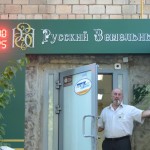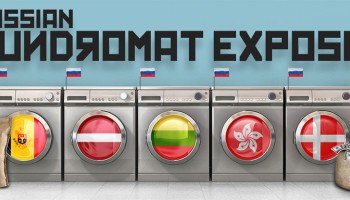After its work on the 2014 series on the Russian Laundromat, the biggest known money laundering operation in Eastern Europe, a source provided OCCRP and Novaya Gazeta with banking records used by the offshore companies that comprised the operation.
At the time of researching and publishing the first Laundromat series, it was not clear that the scheme was still in use. It was also unclear who was making payments into the financial fraud vehicle and who was getting money out.
The anonymous source provided OCCRP with two sets of banking records. The first detailed the transfers of some of the US$ 20.8 billion in and out of Moldindconbank, the Moldovan bank that was the first stop for the Laundromat money on its voyage out of Russia.
The other dataset contained Trasta Komercbanka records. Trasta is the Latvian bank that was the second stop, receiving a about two thirds of the Laundromat money after it passed through Moldindconbank. Its records show the many countries and companies that ultimately received Laundromat funds.
To trace the eventual destination of the funds, the team combined these multiple sources of banking information - some of it in PDF documents - into a usable database.
Assembling this data jigsaw puzzle was made significantly more difficult by the refusal of SWIFT -- a private entity that coordinates global interbank payments -- to provide information about bank routing codes. Data analysts developed a reproducible system of 1,500 lines of SQL and Python code that documented the transformation of the source files into a consolidated database.
The resulting database of 75,000 bank transfers was examined by reporters from 32 countries.
The reporters started following the money for themselves. To share findings and compare notes, OCCRP set up a secure collaborative workspace where, over a period of months, they continuously discussed and debated their findings.
The first thing OCCRP did was to match the names of companies in the Trasta and Moldindconbank records against public international sanctions lists. Several hits led to stories.
They followed the stolen billions by digging through national and international registries of companies, with the assistance of OCCRP’s Investigative Dashboard researchers.
The searches proved challenging, as those behind the fraud tried to cover their tracks by using dummy directors and shareholders. Some, however, were well known from previous investigations, so the reporters knew where to look next. They peeled away layer after layer of corporate secrecy and, in some cases, came up empty.
That is where the collaboration came in.
Colleagues from one country would often recognize the names of companies and individuals dug up by reporters in other regions, enabling them to contribute essential insights and context to this strikingly globalized financial web.
The Panama Papers database of the International Consortium of Investigative Reporters and Süddeutsche Zeitung was very useful in identifying some of the hidden owners as well as some of the core Laundromat companies that showed up in a Mossack Fonseca email exchange.
Reporters also wanted to know how it was possible for billions to flow undetected through some of the world’s biggest banks, so they asked both local and international banks.
The results of the team’s work can be read here, in media in multiple countries and or seen on TV in some media outlets starting today and continuing over the coming weeks or months.
Outlets contributing to this project include:
Armenia - HETQ.am
Austria - Dossier
Bulgaria - Bivol.bg
Czech Republic - Czech Center for Investigative Journalism - Pavla Holcova
Denmark - Berlingske
Finland - Yle
Germany - Süddeutsche Zeitung
Greece - VICE
Hungary - Átlátszó
Italy - Investigative Reporting Project Italy
Jordan - Arab Reporters for Investigative Journalism
Korea - Korea Center for Investigative Journalism
Latvia - Re:Baltica
Lithuania - 15min.lt
Moldova - Rise Moldova
Poland - Newsweek
Romania - RISE Project
Russia - Novaya Gazeta
Serbia - KRIK.rs
Slovenia - Delo
Spain - El Periódico
Switzerland - Beobachter
The Netherlands - De Correspondent
Ukraine - Slidstvo.info
United Kingdom - The Guardian
United States - Barrons; International Consortium of Investigative Reporters
Global - OCCRP
Technical team members include Calib.ro, interactive visualization. OCCRP contributors include: Adem Kuric and Aleksandar Todorovic, web production; Stella Roque and Friedrich Lindenberg, data analysis; and Edin Pasovic, graphic design. Investigative Dashboard Researchers for OCCRP include Lejla Camdzic, Dragana Peco, and Lejla Sarcevic. Editors for OCCRP are Rosemary Armao, Ilya Lozovsky, Jody McPhillips and Drew Sullivan.






